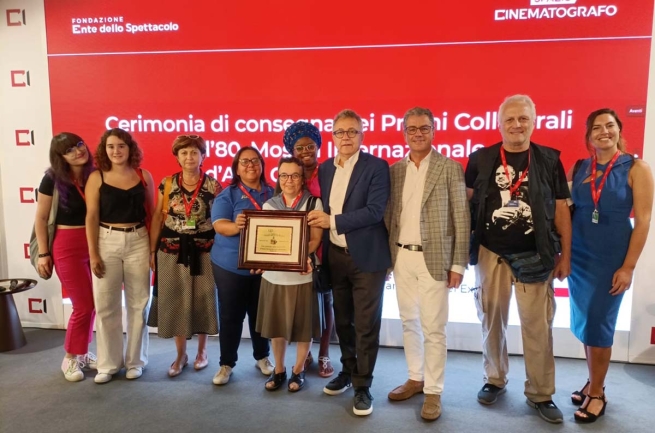The setting of the "oldest" Film Festival in the world, which this year celebrated its 91st anniversary, is excellent, in particular for the opportunity to participate from the privileged perspective of accreditation.
For 26 years, the group participating in the workshop has also played the role of Jury of the "Magic Lantern" Award, recognised by the Film Festival among the Collateral Awards, awarded by the Cinecircoli Giovanili Socioculturali to the most significant film for issues related to the world of young people, related to education and personal growth.
This year the workshop was attended by 23 cultural workers, distributed in two shifts, from the Marche, Liguria, Lombardy, Sardinia, Veneto and Apulia regions, all communication and cultural animators belonging to Salesian CGS circles, mostly aged between 18 and 29.
Beyond the viewing of the films in the programme in the various sections of the Festival, the young people were involved in a daily multi-voice confrontation with contemporary cultural scenarios also through practical training on the language of Cinema, which took the form of the production of film reviews and fact sheets published daily in the “Outside the Chorus” section of the website www.sentieridicinema.it and available immediately after the presentation of the films.
At the end of the Exhibition, within the framework of the "Spazio Cinematografo", curated by the Ente dello Spettacolo Foundation of the Italian Episcopal Conference (CEI) at the Excelsor Hotel in Venice, the CGS Jury awarded the "Magic Lantern" Prize (XXVI edition) to the film "IO CAPITANO", by Matteo Garrone, for the following reason:
"For having constructed a coming-of-age story through the topos of the journey towards the realisation of one's dreams, common to many teenagers, set, however, against the background of the dramatic problem of migration and the 'routes of hope'. At the centre of the narrative are the courage and determination of Seydou who, in a world in which he tends to avoid responsibility, becomes a man when he takes up his role to the end, taking charge especially of the weakest, until the final scream recalled in the title. Interesting, from the point of view of language, is the use of very careful photography, with light that prefers warm and enveloping tones, to underline the colours and shades of Africa. The dreamlike and visionary incursions that accompany the journey give the tale some bright fairy-tale suggestions. The director chooses an apologist style to emphasise the required recovery of migrants' perception of humanity."


